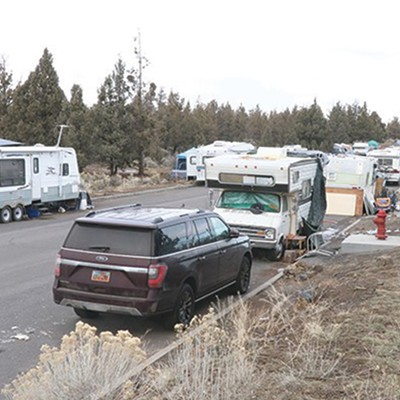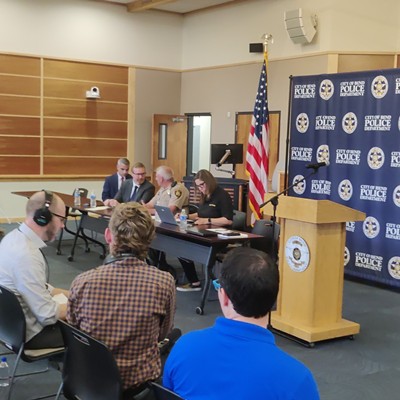Measure 9-110: Yes
City of Bend - Recreational Marijuana Sales Tax
Should Bend impose a 3 percent tax on the sale of recreational marijuana?
As of Jan. 1, 2017, the current tax on marijuana will go from 25 to 17 percent statewide, as the Oregon Liquor Control Commission takes over the regulation of the industry. It's the perfect chance for cities to get their cut. In this case, the 3 percent tax (which would put the total tax on recreational pot at 20 percent in Bend) will go into the city's general fund–a fund that needs boosting to pay for stuff like roads. Estimates are that the tax would add $345,600 in 2017 alone. Dislike potholes? Then puff-puff-give and vote yes for the pot tax.
Measure 94: No
Repeal Mandatory Judicial retirement age, currently 75
Measure 94 amends the Oregon Constitution and would remove the provisions that set the mandatory retirement age at 75 for state judges. It also removes the provision allowing the Legislative Assembly or the people to establish a statutory mandatory retirement age for state judges.
People who support the measure argue that the mandatory retirement age has not been shown to benefit the judicial process and that it does a disservice to judges who are able and willing to serve into their later years. While repealing the mandatory retirement age would allow the very small number of judges who do not want to retire before the age of 75 to continue to serve, in-depth research shows a relationship between aging and a decline in efficiency. Judges who are still working at age 75 have had a good run, but we believe by then, it's time for someone else to have a turn. Vote no on Measure 94.
Measure 95: Yes
Allow State Universities to invest in equities
Ballot Measure 95 allows public universities to invest in equities in order to reduce financial risk.
Opponents of this measure argue that if universities are allowed to invest in equities there is no guarantee that they won't make risky investments, and that they would also have to spend money to hire investment advisors. While there is risk associated with investing in equities, we believe that with oversight that issue can be minimized. A new stream of income could benefit students in a big way, including tuition increases and enhancing important programs. With so many students being dissuaded from going to college by the ever-increasing cost, voting yes on measure 95 means voting yes on making higher education more accessible to everyone, especially middle-class Oregonians. Vote yes on Measure 95.
Measure 96: Yes
1.5 percent of lottery net to veterans' services
In what may be an overlooked issue, Measure 96 is an opportunity for Oregonians to step up to the plate for veterans. For decades, we've known that those who are willing to put their lives on the line have often been ignored once they return home. It's been reported that the suicide rate among veterans is twice the rate of the general population.
Measure 96 was referred to the ballot by the legislature—unanimously. It stipulates that 1.5 percent of the state's lottery dollars would go to fund veterans services, amounting to over $9 million annually that would be used for health, employment, housing, and educational services they aren't getting now.
At the state level, Oregon can help lead the way to fulfilling a promise that has been broken. It's time to put money where our mouth is and support veterans by voting yes on Measure 96.
Measure 97: Yes
Raises Corporate taxes on businesses with annual sales that exceed $25 million
For voters, deciding whether to support Measure 97 will most likely be the single-most difficult decision this election season. Should the measure pass, it's expected to bring in roughly $548 million in new revenue during the 2015-17 biennium, and even more moving forward. To clarify, C-Corporations will only pay the additional tax on anything over $25 million.
As with any measure that imposes a corporate tax, hysteria from the protectors of large corporations and anti-tax increases has reached a fever pitch this election cycle. The specter of trickle-down impacts that will somehow upset the fragile economic balance of our booming economy are everywhere, like so many Halloween decorations. We're not persuaded that the current boom that Oregon is experiencing (due to our business-friendly environment and boundless lifestyle amenities) will be thwarted by this measure. The goblin that really makes us tremble in the night is the poor state of our public education system. Faced with the prospect of doing nothing this election and letting the next generation of Oregonians continue to slide into ignorance over the next four years, we'll take Measure 97. (Not apprised of Oregon's abysmal education outcomes? See this week's Side Notes article for the latest on graduation rates.)
The money from the measure is slated to go toward education, healthcare and senior services in the state. Opponents argue that there's nothing in the measure that specifically earmarks those funds, and because it's not set in legislative stone, we should throw out the entire tax. We don't disagree that this is a flaw in the measure; however we're not overly concerned about the money ending up in some of the other coffers, like PERS, where the funds are badly needed. We trust our legislators to allocate funding according to the voters' desires, which in this case is education funding. And if they don't, we have a mechanism to remove them for their lack of follow through in the next election cycle. In other words, we can vote them out. With this measure we are putting our faith in our elected officials to do the right thing and so should you.
Take this information from the Oregon state Legislative Revenue Office's "Measure 97 Description and Analysis" research report:
"Consumption taxes tend to have a more muted effect on economic activity compared to taxes on income and property which more directly affect the net returns to capital and labor. Our economic simulation shows that if Measure 97 becomes law it will dampen income, employment and population growth over the next 5 years, but all three metrics remain within 1 percent of the current law 2022 projection."
When opponents tell you they're worried about economic growth, they're talking about a less than 1 percent change to our economic situation–with the desired result being an education system that has the funds it needs to graduate kids on time and churn out qualified workers who can contribute meaningfully to our society.
We could also go on about how we don't buy the ugly projections that we'll all be suffering under the weight of immediate price increases or utility hikes. In the case of the latter, prices are set by our public utilities commission, not immediate market fluctuations.
In conclusion, our fear of a poorly educated Oregon population is winning out over our fear that corporations will jump ship and leave our state when faced with paying a more equitable share of taxes. Some might leave, but we believe that Oregon's culture and lifestyle are still a draw that make workers and corporations want to stay.
Our education system is in crisis mode, and while Measure 97 is not a perfect piece of legislation, we cannot wait for yet another election season to start fixing the problem. In January, get on the horn and tell your local legislators that you'll be watching as they allocate these funds. Before that, vote yes on Measure 97.
Measure 98: Yes
Oregon State funding for dropout prevention/career college readiness
Measure 98 would require the Oregon Legislature to distribute at least $800 per high school student each year for establishing or expanding career and technical education programs, college-level educational opportunities and dropout-prevention strategies. Have you seen our state graduation rate lately?
Opponents are concerned that it will pull funds from other state services—but with Oregon's graduation rate 10 points below the national average, programs that support high school students and help them find success are greatly needed. We believe voting yes on this measure shows our young people that we are committed to and value their education, and also ensures that they are better prepared for life after school, whether they choose to go onto college or not. Vote yes on Measure 98.
Measure 99: Yes
Oregon Outdoor School Lottery Fund
Measure 99 would create an Outdoor School Education Fund with 4 percent of the revenue or between $5.5 and $22 million per year from the Oregon State Lottery Fund.
Opponents of this measure argue that the money used to fund the nonprofit Save Outdoor School for All will be taken away from the state's economic development programs. While boosting young businesses is a good thing, young people need our support more right now. Outdoor School is a valuable enrichment tool that won't bring new teachers into our classrooms, but will still benefit our young people and continue our state's tradition of nurturing environmental awareness. Vote yes on Measure 99.
Measure 100: Yes
Oregon Wildlife Trafficking Prevention
Measure 100 would ban the sale of products and parts of 12 types of endangered animals in Oregon, including the elephant, rhinoceros, whale, tiger, lion, leopard, cheetah, jaguar, pangolin, sea turtle, ray and shark (except the spiny dogfish).
Currently, Oregon law only prevents the sale of shark fins. Supporting this measure will not only help put an end to poaching, it will also demonstrate Oregon's commitment to international conservation and animal welfare standards. This one is pretty much a no-brainer, from our perspective. Save the whales and vote yes on Measure 100.



![WATCH: Jamie McLeod-Skinner endorsement interview ▶ [with video]](https://media2.bendsource.com/bend/imager/watch-jamie-mcleod-skinner-endorsement-interview-with-video/u/r-bigsquare/16708540/screen_shot_2022-04-27_at_2.01.34_pm.png?cb=1680199048)
![WATCH: Oregon Congressional District 5 Republican primary interview ▶ [with video]](https://media1.bendsource.com/bend/imager/watch-oregon-congressional-district-5-republican-primary-interview-with-video/u/r-bigsquare/16708523/screen_shot_2022-04-27_at_2.00.34_pm.png?cb=1680199055)


















